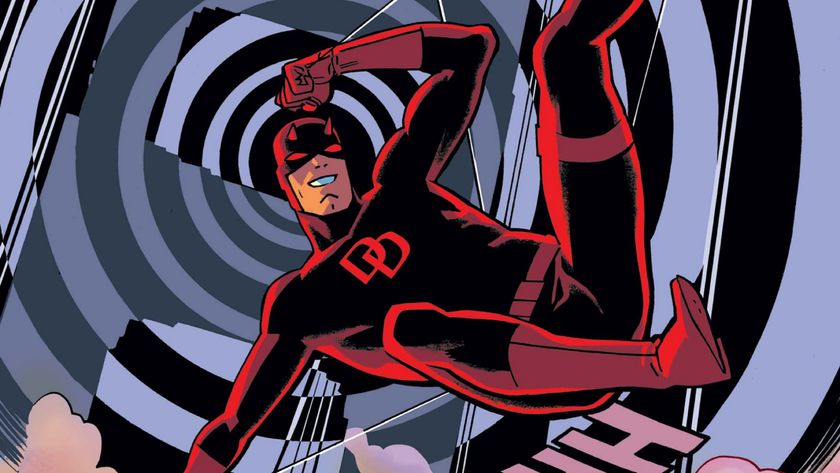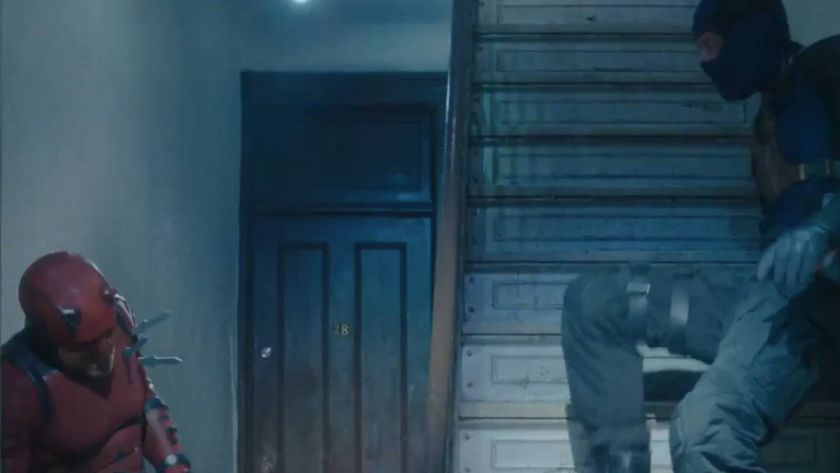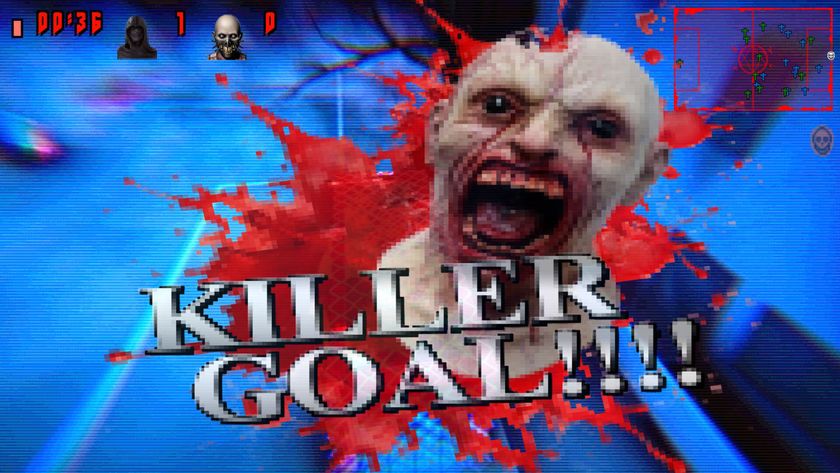SFX Issue 33
None
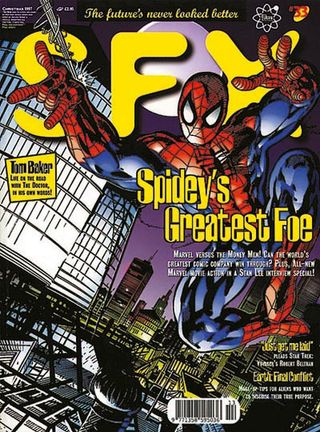
Christmas 1997
SFX historical note: This cover was specially commissioned by SFX from a then relatively new artist recommended to us by Marvel, called Bryan Hitch…
Isn’t It About Time You Gave The Tripods Another Chance?
The series which was supposed to replace Doctor Who crashed and burned in 1985, and few are campaigning for its revival. But there’s hidden gems in The City Of Gold, says Diane McGinn…
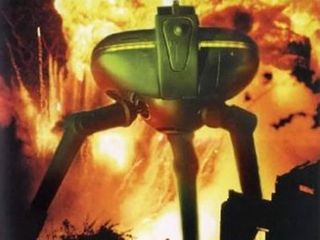
The case for the prosecution: Compare and contrast, ladies and gentlemen... On the one hand, we have the publicity of the time – a science fiction epic, adapted from John Christopher’s classic children’s novels, featuring ground-breaking special effects and monsters who’d make the Daleks look like jokes. And then there’s the reality – a yawn-inducing ordeal, padded out with lectures on vine-growing nicked wholesale from Gardeners’ World , and eponymous monsters that put in a CSO-fringed appearance about once a month.
The case for the defence: Yes, they made a mistake calling it The Tripods, because that’s not really what the series is about, at least to start with. The first book, The White Mountains, is a novel about a teenager’s coming-of-age, and it would have worked better in the classic serial slot where they did that rather good version of The Invisible Man than as a rival to Doctor Who .
Prosecution: Well, that’s really the sort of stuff to keep science fiction fans glued to their seats.
Sign up to the SFX Newsletter
Get sneak previews, exclusive competitions and details of special events each month!
Defence: But it’s the science fiction elements which make the series stand out from the crowd. Take a look at that opening sequence – a quiet English village, filled with peasants going about their pastoral ways... But the caption tells you that this is England in the 21st century... It all adds up to an intriguing mystery, which is solved when a Tripod makes its first appearance. A full-size foot slamming into the village pond, a three-fingered mechanical hand reaching down from the heavens to grasp one of the village teenagers, and a great effects shot of a three-legged fighting machine towering over the village. Even George Pal couldn’t manage that in War Of The Worlds .
Prosecution: Well, that’s an interesting five minutes. If you can find another 20, we can cut the whole show down into a single decent episode.
Defence: Actually, the first instalment’s quite fun. You learn about the world of the 21st century as the two teenagers, William and Henry, discover the history the Tripods have suppressed. The aliens invaded Earth decades ago, suppressed mankind’s technology, and now fit everyone with a thought-controlling “cap” on their 16th birthday. Which is why the adults all insist the Tripods are a paternal force who are helping mankind survive. You get a real evocation of the horror the boys feel at the idea of losing their free will just as they’re beginning to wonder about the world, and there’s a simple awe to the scenes where they inspect a relic of human technology – a pocket watch with a musical mechanism.
Prosecution: Pass the sickbag.
Defence: No, really. It’s a great moment, a true Clarke-ian Sense Of Wonder at the miracle of technology. Anyway, the boys then set out to explore the world and track down the renegade Freemen who are trying to overthrow the Tripods.
Prosecution: Unfortunately, the rest of the world consists of rascally sea captains who’ve escaped from a bad production of Kidnapped , and a CSO replica of Paris which would’ve shamed Doctor Who ten years earlier. Unless, of course, the way the Eiffel Tower wobbled was meant to indicate how badly the Tripods had damaged it...
Defence: Yes, the Parisian interlude was weak, but it was a good try, and the Captain Curtis sequence works in context. They had to get across the Channel somehow, and that sort of nautical adventure is one of the classics. Besides, you reach the meat of the plot after that.
Prosecution: Which is?
Defence: The whole business at the Chateau. Will, Henry and Bean-pole…
Prosecution: Who the hell’s Bean-pole?
Defence: It’s a nickname for Jean-Paul, the French kid who joins them in Calais. Yes, it’s stupid, but that’s what kids are like. Anyway, they stop off at a French chateau, where Will saves the life of a young aristocrat, falls in love with her and ends up as the rival to a local count. Classic coming-of-age stuff.
Prosecution: It’s not science fiction though.
Defence: It is when Will’s idyll is interrupted by the discovery that Eloise is already a capped slave, and he’s forced to choose between losing her or his own freedom of thought. And then he loses her to the Tripods anyway when she’s taken away to work in their city. Great stuff – young love, tragic separation – and some Tripods too!
Prosecution: About time. Bet they don’t stick around for long, though.
Defence: Actually, they do. They even capture Will, in a rather impressive sequence, and plant a tracker on him in the hope that he’ll lead them to the Freemen’s base in the White Mountains.
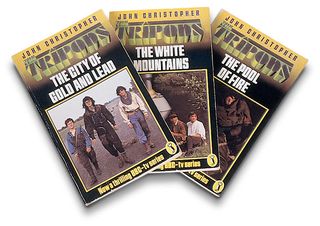
Prosecution: Okay, so things are looking up. But I remember what happens next. They finish off the tracker plot inside five minutes, and then…
Defence: All right. What happened next was unforgiveable... Fill us in on the grim details.
Prosecution: Instead of getting on with a decent plot now Will’s been forced to grow up, they do the whole rigmarole again with Henry. Only without the interesting bits. This time around he just falls in love and has to decide whether to stay at the vineyard or not. No Tripods, just a three-week lesson in wine-making, on prime-time TV!
Defence: That’s indefensible, I know, and it’s not even in the book! But if you forget that bit, and the rigmarole about unconvincing cannibals…
Prosecution: That’s the bit covered by the phrase, “We came to a town and stole some bread” in the book, isn’t it?
Defence: I said forget about it. If you do, the first season makes a decent little six-week serial. The mistake was trying to pad it out into a 13-week epic. But it hots up nicely at the end, with a bunch of laser-armed Tripods hunting the heroes down.
Prosecution: Pity they couldn’t finish the job. Anyone who could put up with those three for 13 weeks must have had a cast-iron stomach.
Defence: Actually, John Shackley was a pretty good Will. He starts out wet as water, but that’s the point of the character. Over the season he grows into someone who can blaze with anger at the Tripods’ tyranny, and stand up to the bunch of Black Guards who capture them at the season’s end – a nicely Kafka-esque touch, as the Black Guards are actually Freemen attempting to find out whether their new recruits are Tripod spies.
Prosecution: But what about the other two... Henry and Jean-Paul?
Defence: Well, Jim Baker was pretty awful as Henry, but then he had a nauseating part, and Ceri Seel might have been good if it hadn’t been for the accent. Besides, they were both written out, more or less, in the second season, and that’s when The Tripods started getting good anyway.
Prosecution: It couldn’t get worse, unless they featured the Tripods even less.
Defence: Well, realising that was a good thing. Whereas the first season had been adapted by Alick Rowe, who wanted to emphasise all the teen-angst stuff, Christopher Penfold took over for the second year, and started adding in Tripods left, right and centre. Inside the first five minutes of the season they’ve attacked a Freemen base, crushed a few rebels under foot, and lasered a few others for good measure. Cracking stuff!
Prosecution: Too little, too late, and it got followed up by three episodes of cod Olympics and more wandering around Europe.
Defence: But that leads up to Will and Fritz getting selected to serve the Tripods, and that’s where Christopher Penfold lets rip. Once they’re inside the Tripod city he adds loads of hard-core SF to the books, and produces a six episode arc which is pure gold.
Prosecution: Sorry. I must have given up by then.
Defence: A lot of people had. But the effects were really rather impressive for the BBC in the ’80s. To start with, you had the Tripod city itself, a vast array of pyramids which took up an entire warehouse at the BBC’s special effects unit, complete with lasers reflected from the Pool Of Fire across the entire metropolis.
Prosecution: One good effect does not a series make. If it did, Battlestar Galactica might have survived the scripts.
Defence: But the live action material was also impressive. For a start, there were the Tripod Masters themselves – six-foot tall, three-legged creatures a bit like intelligent cucumbers. When you consider that Doctor Who was fitting people out with yellow-dyed hair and blue-painted faces and pretending they were androids at the time, they’re pretty convincing...
Prosecution: They look pretty unconvincing compared with the Shadows though.
Defence: But The Tripods also pioneered virtual sets, whatever Babylon 5 might claim. There’s an entire episode set in the mental world of the Cognoscs, filled with surreal CGI-ed sets.
Prosecution: The Cognoscs?
Defence: That was the really good bit of the season, and an idea which wasn’t in the book. The Tripod cities provide a home for creatures of pure energy, who inhabit the towers but despise the Tripods’ plans to wipe out humanity by converting the atmosphere to suit their own tastes.
Prosecution: Do I spot a cop-out ending where the Cognoscs save mankind?
Defence: Quite the reverse. They don’t give a damn, so long as they’re not around when something that distasteful occurs. The second season has a healthy dose of cynicism to it, from Robin Hayter’s performance as Fritz, the embittered German who accompanies Will into the city, to the ending – a devastating cliffhanger where Will returns to the Freemen’s base to find the Tripods have wrecked it.
Prosecution: If it had suddenly got so good, why didn’t it get a third season?
Defence: Because the lead-times in TV are so long that you end up giving the go-ahead for each season before the last one’s been transmitted. Season one did so badly it got cancelled.
Prosecution: That doesn’t make sense.
Defence: Tell that to the BBC, not me. They’d already shot the modelwork for the third season, which has got all the exciting stuff as the Freemen attack the Tripod cities, and could have sold the lot abroad if they’d completed the trilogy. But this was in an era when the BBC were trying to save money by axing Doctor Who (even though it made a profit), so they weren’t going to let that bother them.
Prosecution: And that’s supposed to be a defence? Season one would have been good if it had been half the length, and season two was pretty good when they added stuff to the book?
Defence: But it did catch on with the kids. The BBC got so many letters from teenagers who’d liked it as children that they put it out on video.
Prosecution: I’ve seen those videos. Three quid each in the dump-bin at the local clearance shop.
Defence: Well, that’s the BBC’s marketing genius for you. They tried to milk the market by spreading the overlong season one across four tapes, and people gave up. If they’d put the lot on a twin-pack, they may have persevered. Certainly, the season cliffhanger would’ve brought people back for more. It’s a pity really as there’d be a market for season two if they put it out properly...

Dave is a TV and film journalist who specializes in the science fiction and fantasy genres. He's written books about film posters and post-apocalypses, alongside writing for SFX Magazine for many years.
Most Popular





